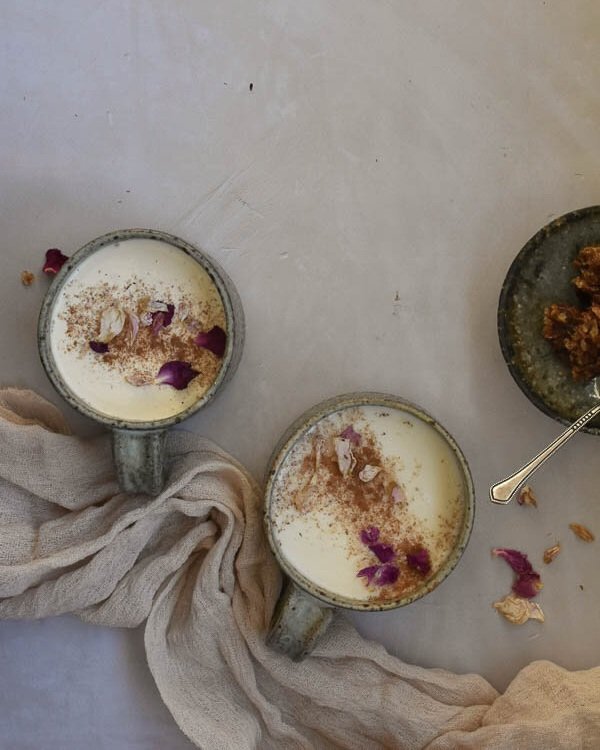
Some days your cup feels full. You feel alive and whole and thoroughly grateful for what you have. Other days, your cup feels depleted. You gave too much without replenishing, and you feel tired and worn. These are times you need to recharge your body and mind, to get back to your true state of health and vitality. Tonight, fill your cup with warm, spiced milk.
Ayurvedic self-care
Ayurveda prescribes nourishment. Small acts of self-care, such as abhyanga or drinking warm milk at night, create an overall feeling of wellness. The more you give to yourself in small, healthy ways, the less you’ll be tempted to indulge in sense pleasures that don’t serve you. When you develop a daily practice of nourishment, you’ll build a foundation of balance in your life that will support you even when outside challenges arise.
You may already have a dinacharya, or daily routine, that outlines self-care practices for the daylight hours. But a nighttime routine of calming down with warm milk is a lovely way to end your day. Food is medicine, and Ayurveda views cow’s milk as among the most nourishing, nurturing foods available. It provides one of the most direct forms of prana, so drinking it when you feel weak or depleted rebuilds ojas, or vitality, and gives you more zest for life.
Milk at night also acts as a form of self-care because it prevents you from snacking before bed (a sure way to weaken agni, digestive fire) and supports deep, restful sleep. While there are many nut or rice milks on the market, the qualities of fresh cow’s milk are unsurpassed. Its heaviness grounds a scattered vata mind, and the cooling qualities of dairy dampens pitta’s fire. It can increase kapha, but taking it in small amounts and with spices is fine if there is no significant kapha imbalance.
An Ayurvedic perspective on cow milk
Humans have been drinking cow’s milk for centuries, but a lot of uncertainty has come about it in recent years. People have concerns about digestibility, ethics and health. But shift your mind away from the form of milk you know today and look at the way humans have been drinking it for thousands of years. You’ll see that the concerns are the result of imbalanced living, not the cow milk itself.
It is only recently in our history that milk has begun to be consumed the way it is now: taken from poorly-treated cows, highly processed and served ice cold in large quantities. These changes contribute to the increase in intolerance that we have seen in the past 50 years (weak agni from practices of imbalanced eating also make dairy and other foods, such as gluten, difficult to digest), and create many environmental consequences from large-scale commercial dairy farming.
Ayurveda offers a different way to drink milk, one that will change your relationship with this amazing food. When you drink milk in the way it was intended by nature, you’ll appreciate the gift that cows offer us, and enjoy a nourishing nighttime routine.
Here are some ways to enjoy a positive relationship with milk:
-
Spend the time and money to support ethical dairy farming. The cows who produce most commercial milk for sale are not given the respect they deserve. The way this can change is when you decide to support something different. Buying organic milk is a start, but there are plenty of small dairy farms that raise cows with access to open pastures and avoid antibiotics and growth hormones. Look for one that offers a cow share, where you can receive raw, organic milk in exchange for supporting their operations. Milk produced this way may be more expensive, but the quality is entirely different from what you get in a store. It’s an investment in your health and karma.
-
Drink milk with dwanda, or wholeness. The foods that nature gives us are perfect in their delivery. This is the Ayurvedic concept of dwanda, the idea that all parts of a food have a purpose. For instance, the fats in whole milk protect your brain and nervous system. The enzymes in raw milk help you digest the fats. When we begin to dismantle the gift that nature has provided us with homogenization and removing fat, your digestion simply cannot recognize it as food. At minimum, buy organic whole milk, ideally unhomogenized. But raw milk truly has the most dwanda and the most nourishment.
-
Drink milk warm and spiced. Milk is heavy and, in its whole form, full of rich, nourishing fats. Serving it cold diminishes agni, making milk difficult to digest. Adding ghee and digestive spices (as in our recipe below) makes it much easier to assimilate and even tastier. Plus warm milk is a nourishing gift.
-
Drink less milk in a sitting. When you see milk as the gift it is, you’ll appreciate it more. You won’t be tempted to guzzle it out of the carton. Instead, you can find connection with it as you warm just a half cup of milk and slowly sip it as part of your nighttime routine.
Try our recipe for warm milk and see how nourishing it can be. Turn off your electronics, find a cozy spot and sip quietly while you reflect on your day.
Warm, spiced milk
Serves 1
There are plenty of options for spices; choose what your body needs. We also enjoy fennel and black pepper or clove and cardamom. Add a little nutmeg to help your sleep.
You'll need
½ cup whole, organic, non-homogenized milk (raw is best)
½ tsp. ghee
⅛ tsp. cinnamon
⅛ tsp. cardamom
1 tsp. honey or maple syrup (honey is more warming, maple syrup is more cooling)
Here's how
Add ghee and spices to a pot, then add the milk. Bring the milk just to a boil and turn off immediately. Add maple syrup or, if you are using honey, let the milk cool to a moderate temperature before adding. Find a quiet place to relax and enjoy this gift.
Visit our Ayurveda Lifestyle page for kitchen essentials
